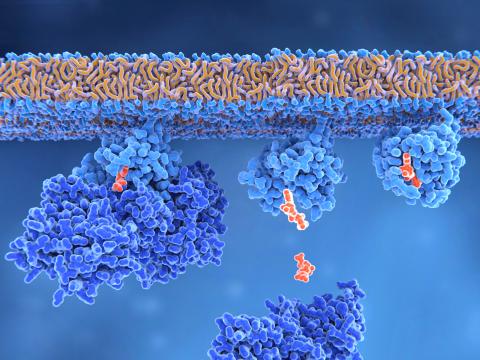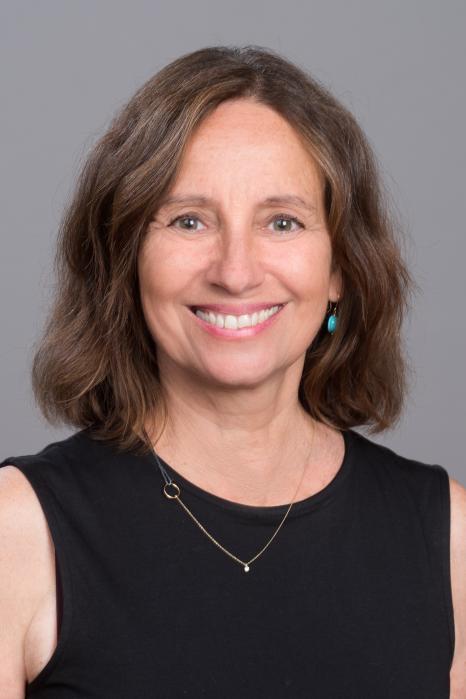
Jacqueline Cherfils: from molecular switches to drugs
Jacqueline Cherfils is CNRS Director of Research at the Laboratory of Biology and Applied Pharmacology (LBPA - Univ. Paris-Saclay, CNRS, ENS Paris-Saclay), where she heads up the Structural Biology of Small GTPases team. For over 25 years, she has dedicated her research to these proteins essential to human cells, with major successes in understanding their natural mechanisms and their use for therapeutic purposes.
"My daily motivation? Answering the fundamental biology questions that ultimately lead to treatments for serious pathologies," sums up Jacqueline Cherfils, who tirelessly tracks down the molecular workings of GTPases using innovative techniques. "This is a large family of proteins (classified into five main subfamilies: RAS, RAB, RHO, RAN and ARF), which control most of our cells' major physiological functions. Each of them has a specific role," the researcher explains. However, some of them are involved in serious illnesses such as cancer, heart failure, rare diseases and infections. "Understanding how GTPases work is therefore essential for devising drugs that will effectively target those that are defective."
Proteins in ON/OFF mode
In her research, Jacqueline Cherfils uses integrative structural biology, a combination of biochemistry, biophysics and structural biology methods, notably crystallography, which involves growing tiny protein crystals that are studied using synchrotron radiation X-rays. In 1996, she described one of the first structures of a small GTPase switching from the inactive (OFF) to the active (ON) state, and shortly afterwards the first structure of a GTPase-activating protein. "Small GTPases act like switches, with an OFF mode and an ON mode. To switch to ON mode, they need an "activator", another regulatory protein without which nothing happens."
Like double-sided tape
With these initial scientific successes, Jacqueline Cherfils obtained funding to set up a team and purchase equipment. Since the late 90s, she has been particularly interested in ARF family GTPases, related to the RAS oncogene. "When RAS carries certain mutations, it remains in the ON position, and cells form tumours, leading to many cancers. That's why it's so important to find out how GTPases can be blocked." ARF GTPases have a natural inhibitor that is highly prized in cell biology, brefeldin A, the only GTPase inhibitor that was known at the time. In 2003, the biologist and her team discovered that this inhibitor worked in an astonishing, totally counter-intuitive way. "Our GTPases need activators to which they bind in order to become active. However, instead of preventing this binding, brefeldin captures the GTPase and its activator like double-sided tape, a completely new inhibition mechanism inside cells." This discovery was a great leap forward in biology and marked Jacqueline Cherfils' career. "We had never before imagined that a small molecule could interfere with proteins in this way, opening up completely new horizons for drug discovery."
The role of cell membranes
Since then, the biologist has been working to establish an "instruction manual" for the biochemical mechanisms of GTPases. In association with Rodolphe Fischmeister and Labex LERMIT, she has just discovered the essential role of cell lipid membranes in the RAP GTPase activation system. This has had an unexpected consequence: "The membrane is also essential for blocking this system using a very promising inhibitor in heart failure, raising great hopes for a treatment."
The understanding of the molecular causes of disease, and its therapeutic value, explain the many sources of funding for Jacqueline Cherfils' research: contracts from the French National Research Agency (ANR), research programmes from the Cancer Research Foundation (ARC), the Medical Research Foundation (FRM) and the National Cancer Institute (INCa), not to mention the prestigious Human Frontier Science Program (HFSP). However, the researcher prefers the fundamental aspect of her research: "My job is predominantly to produce original ideas by thinking outside the box." In this respect, she believes that Université Paris-Saclay is conducive to the emergence of a good balance between fundamental research and industrial value-creation.
From mathematics to biology
Far from imagining that she would one day pursue a career in research, Jacqueline Cherfils initially focused on mathematics, a discipline in which she excelled during her secondary school years. After a two-year preparatory course, she joined the University of Aix-Marseille, where she discovered a creativity and open-mindedness that motivated her. After her 2nd year Master's, Jacqueline Cherfils needed to find a job. She applied her mathematical skills to biological modelling. After an initial experience in tumour tomography at the Gustave Roussy Institute, she moved to Dassault Aviation as an engineer, before joining the Orsay biophysics laboratory in the early 1980s. "I had a lot of energy for thinking about biology differently!" For about ten years, Jacqueline Cherfils modelled proteins. She defended her thesis in 1987 and spent a few months as a post-doctoral fellow at Harvard in the laboratory of William Lipscomb, winner of the 1976 Nobel Prize for Chemistry. She became a CNRS Research Fellow in her original laboratory three years after her thesis defence. On returning to France, her laboratory moved to Gif-sur-Yvette in 1992, becoming the Laboratory of Enzymology and Structural Biochemistry. It was at this point that she moved away from theory alone and embarked on experimental structural biochemistry, setting up her own team in 1997. Obtaining her Accreditation to Supervise Research (HDR) in 1998, she became a CNRS Director of Research and took over management of the laboratory from 2005 to 2014. She then joined the Biology and Applied Pharmacology Laboratory in 2015.
A dazzling career
Jacqueline Cherfils was President of the French Crystallography Association (2010-2013), which also opened doors for her in other European and international learned societies. Elected in 2021 as a member of the European Molecular Biology Organization (EMBO), awarded the National Order of Merit in 2016, visiting professor at Berkeley's Miller Institute in the same year, and winner of the 2019 Émile Jungfleisch Grand Prix in Chemistry and Life Sciences awarded by the French Academy of Sciences, Jacqueline Cherfils' work has won countless awards. But it's undoubtedly her latest accolade, her Femmes en têtes 2023 (Women in the Lead) portrait by the College of Academic Learned Societies of France, which recognises women with outstanding scientific careers, of which she is most proud. "The research world is still very hard for women," she concludes. Which is why she advises young female researchers "to believe in themselves", and young male researchers "to dare to be feminists".
